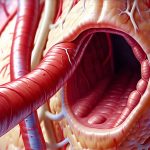Gastroesophageal reflux disease (GERD), commonly experienced as heartburn, affects millions worldwide. It arises when stomach acid frequently flows back into the esophagus – the tube connecting your mouth to your stomach. This backflow, or acid reflux, can irritate the esophageal lining, causing discomfort and potentially leading to more serious complications over time. While medication and dietary changes are often recommended for managing GERD symptoms, many individuals seek simpler lifestyle adjustments that might offer relief. One frequently discussed adjustment is sleeping position, specifically whether favoring the left side could lessen GERD symptoms. This seemingly simple act has sparked considerable interest, prompting investigation into the physiological reasons behind it and its potential benefits.
The idea isn’t new; anecdotal evidence and some preliminary studies suggest a link between sleep positioning and acid reflux. However, the relationship is complex, and there’s no one-size-fits-all answer. Individual experiences can vary significantly based on factors like body weight, severity of GERD, and even pre-existing conditions. This article will delve into the potential mechanisms behind why sleeping on the left side might help with GERD, explore the scientific evidence (and its limitations), and offer practical considerations for those looking to try this approach as part of their overall management strategy. It’s crucial to remember that lifestyle adjustments are often best implemented in conjunction with medical guidance, not as a replacement for it.
The Physiological Rationale Behind Left-Side Sleeping
The proposed benefit of left-side sleeping stems largely from the anatomy and physiology of our digestive system. Gravity plays a significant role in how stomach contents behave during sleep. When lying on your right side, gravity can actually facilitate acid reflux because the esophagus enters the stomach on that side. This means the lower esophageal sphincter (LES), the muscle preventing acid backflow, is naturally more vulnerable to pressure and potential opening when you’re positioned this way. Think of it like a valve being weighed down – it’s easier for things to flow backwards.
Conversely, sleeping on the left side utilizes gravity to your advantage. The esophagus is higher relative to the stomach, making it harder for stomach acid to travel upwards against gravity. This positioning potentially reduces pressure on the LES and minimizes the risk of reflux. It’s also believed that lying on the left side allows the pyloric sphincter (the valve between the stomach and small intestine) to function more effectively, aiding in gastric emptying. Faster emptying means less material available to reflux into the esophagus.
Furthermore, the positioning can influence digestive efficiency overall. The stomach is situated asymmetrically within the abdomen, with the lower esophageal sphincter typically positioned higher when lying on the left side. This difference, while subtle, can contribute to a reduced likelihood of acid escaping upwards and irritating the sensitive esophageal lining. It’s important to note that this isn’t about completely eliminating reflux – it’s about potentially reducing its frequency and severity. Understanding food intolerance can also help manage GERD symptoms.
Evidence & Limitations: What Does Research Say?
Research investigating the link between sleep position and GERD is still evolving, but some studies offer intriguing insights. Several smaller studies have indicated that patients with GERD report fewer symptoms when sleeping on their left side compared to those sleeping on their right or back. However, these studies often rely on self-reported data which can be subject to bias. Individuals may perceive improvements even if objective measurements don’t reflect significant changes.
The challenge lies in accurately measuring acid exposure and reflux events during sleep. While techniques like esophageal pH monitoring exist, they are invasive and not typically conducted solely for assessing the impact of sleep position. Many studies have used symptom diaries or questionnaires, which provide valuable information but aren’t as precise. Another limitation is that many studies don’t control for other factors influencing GERD, such as diet, medication use, body mass index (BMI), and smoking habits.
Despite these limitations, the consistent trend across multiple studies suggests a potential benefit to left-side sleeping. It’s not a guaranteed solution, and its effectiveness seems to vary considerably between individuals. Some people experience substantial relief, while others notice no difference at all. More robust, large-scale studies are needed to fully understand the relationship and identify which patients are most likely to benefit from this simple lifestyle modification. It’s also worth noting that some research suggests elevating the head of the bed can be even more effective than simply changing sleep position. Considering plant milks might also reduce digestive discomfort.
Optimizing Sleep Position for GERD Relief
If you’re considering trying left-side sleeping, here are some practical tips:
- Gradual Transition: Don’t try to force yourself into a new sleep position overnight. It takes time for your body to adjust. Start by incorporating short periods of left-side sleeping and gradually increase the duration as you become more comfortable.
- Pillow Support: Use pillows strategically to support your back and maintain the left-side position throughout the night. A wedge pillow specifically designed for elevating the upper body can be particularly helpful, even if you aren’t exclusively a side sleeper. It supports both head and torso, minimizing reflux.
- Avoid Late-Night Meals: Eating large meals or consuming trigger foods (like spicy, fatty, or acidic items) close to bedtime can exacerbate GERD symptoms regardless of sleep position. Allow at least 2-3 hours between your last meal and going to bed. Many find overripe fruits easier to digest, too.
Beyond Sleep Position: A Holistic Approach
It’s crucial to remember that sleep position is just one piece of the GERD management puzzle. A comprehensive approach addressing multiple factors is far more effective. Relying solely on a change in sleeping position without addressing other contributing factors may yield limited results.
- Dietary Modifications: Identifying and avoiding trigger foods is paramount. Common culprits include caffeine, alcohol, chocolate, citrus fruits, tomatoes, and fatty foods.
- Weight Management: Obesity increases the risk of GERD, as excess weight puts pressure on the abdomen and LES. Maintaining a healthy weight can significantly reduce symptoms.
- Lifestyle Adjustments: Quitting smoking, reducing stress levels, and avoiding tight-fitting clothing are also beneficial strategies. Gut health plays a large role in overall well-being.
When to Seek Medical Attention
While left-side sleeping may offer some relief for mild GERD symptoms, it’s essential to consult a healthcare professional if your symptoms are severe or persistent. – Signs that warrant medical attention include:
– Difficulty swallowing (dysphagia)
– Chest pain
– Frequent vomiting
– Unexplained weight loss
– Chronic cough
These could indicate more serious complications, such as esophagitis, Barrett’s esophagus, or even esophageal cancer. A doctor can accurately diagnose your condition and recommend appropriate treatment options, which may include medication (such as proton pump inhibitors or H2 blockers) or in some cases, surgery. Self-treating GERD without professional guidance is not advisable. Lifestyle modifications should complement medical care, not replace it. Exploring certain herbs may provide additional support, but always consult a doctor first. Additionally, consider whether cold breakfasts might be contributing to your symptoms.


















